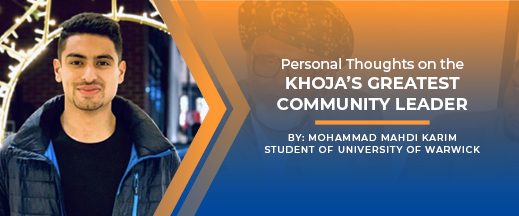Read the full report of our fourth Executive Council meeting of the term 2017-2020, held in Toronto.
< Back to Why is Mulla Asghar as Relevant Today as he was 20 Years Ago?

For me, leadership is the ability to covert a foresight into an actuality. It constitutes having the capacity to stay grounded and calm in a time of crisis to enable decisions being made to be based on rationality rather than emotion. It harbours the capability to equalise the results of success and hardship as the same, so you don’t give up after a setback, and so you don’t become complacent after successive successes, ensuring you can move onto delivering your next responsibility efficiently. Yet above all, the litmus to measure the success of a leader is to see how recognisable they are, not only through their name being constantly repeated but by their actions having effects, of which the benefits are still being reaped long after their demise.
This year marks twenty years since the death of the Khoja world’s most recognisable community leader, who espoused all the above traits, Mulla Asgharali M.M. Jaffer. Twenty years on, Mulla Asghar’s is still remembered with a renewed sense of fervour, year on year, whether that be from the pulpit, where numerous scholars have cited him as a role model or teacher, from the realm of sport, where thousands participate in the Mulla Asghar Memorial Tournament (MAMT) in Europe, or from the world of academia where many use the Mulla Asghar Memorial Library and Research Centre (MARC) in Canada.
What is truly incredible to note is that these initiatives ensure that Mulla’s legacy transcends across many geographies and age groups. The iconic name “Mulla Asghar” means something even those who never lived at the same time as him. The latter group is the one which I fall under, as being born in June 2001 meant I never had the opportunity to meet this remarkable person. Yet after reading about him, I thought I would write about his life and legacy from the viewpoint of someone who never saw him, yet as someone who is still benefitting from his leadership.
Converting foresight into an actuality
Mulla Asghar had a track record of converting his vision’s into realities. In 1963, he was instrumental in setting up the Zanzibar relief fund to assist those who have been impacted by the dramatic effects of the Zanzibar revolution. The greatest conversion of a vision into an actuality was the founding of The World Federation in 1976 in London, England. In my view, the aim of setting up this organisation was to bring together the Khoja communities of the world to showcase that we are a diverse group of people with a wide array of talents. In a time when Islam was being treated as “another,” the body would be an organisation which enabled Muslim communities to aspirationally aim high, have a sense of belonging, so they were not net recipients of society, but net contributors. His vision enabled a group of first-generation immigrants to have the tools to not only survive but thrive in their society which their offsprings continue to reap rewards from. From providing religious education in a society where we had newly settled to raising aid for those who needed it the most, the organisation balanced the needs of the Khoja people with our responsibility to help the wider society.
Treating success and hardship just the same
It was clear that one of Mulla’s strengths lay in his powerful style of oratory, where he would be able effectively yet efficiently convey Islamic messages to the wider community. Adding a touch of his charisma ensured the messages he delivered always seemed fresh, thereby enabling those around him to constantly be inspired. Moreover, his ability to speak seven languages fluently ensured his wisdom and knowledge could cover many large geographical areas. He was commended by many Islamic academics, including the Grand Ayatollah Khoei who was Mullah’s friend, on his extensive knowledge about Islam which he would convey so passionately during his lectures.
Amongst all his success, Mulla Asghar did face many hardships, notably the imprisonment of him and his wife in 1984 for three months in Iraq by Saddam Hussein. The state of panic which ensued in the Khoja world after news of this spread was a testament to his paramount role as a leader in their lives. Yet after international pressure, he was released.
He did not let this huge hardship or his great successes act as an obstacle in fulfilling his vision, as when he returned he continued to serve and lead his community.
How to create influential leaders in the future, expounding upon Mulla’s principles.
The greatest service we can do to repay Mulla is not by exactly replicating his leadership or trying to be like him, rather by taking the principles he held dearly onto and applying them effectively in our world today. The specific acts he carried out as a leader were bound to the time he lived in. Yet, the principles of holding Islam at the centre of his decision-making process, aiming to serve for the sake of God, and ensuring the community moves from the mode of surviving to a mode of thriving. These are the timeless lessons which we can instil in our generation of youths who will become the leaders of tomorrow. Therefore to be effective leaders in the future, we don’t need to replicate him, rather continue the principles he abided by, to effectively combat the challenges we face as a community today.
Related News
Related News
Our Khoja community is one of great success and triumph and just recently, two members of our community were recognised for their incredible achievements
The World Federation and The Sanita Merali Trust of the United Kingdom have committed financial support for the AFED Housing Project, thanks to the efforts of Alhaj Ahmed Daya, Executive Councillor of The World Federation.












